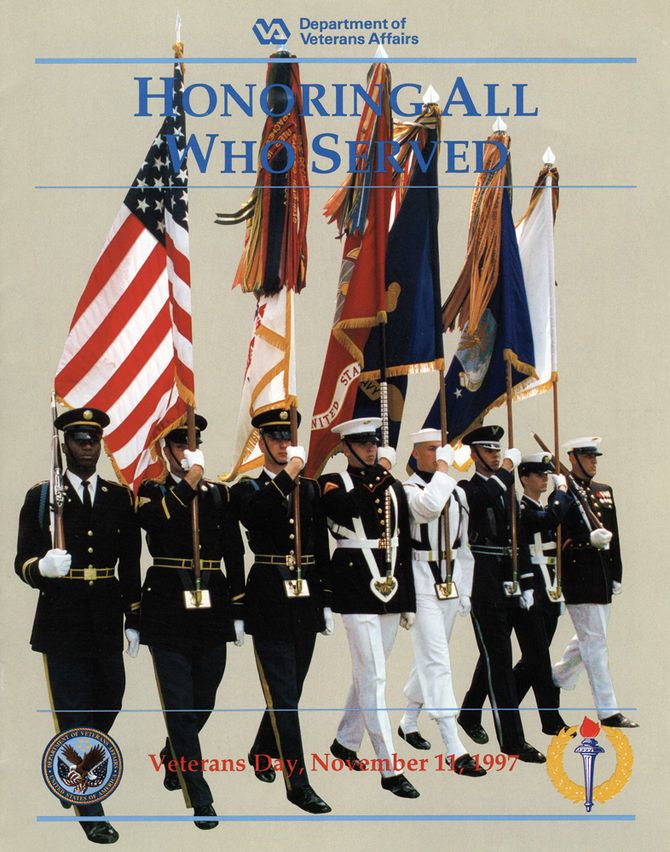“Reporting in, Sir!” Using your GI Bills- that’s plural
“Reporting in, Sir!” Using your GI Bills- that’s plural
By Jerry Field

English: Veterans Day poster for 1997. (Photo credit: Wikipedia)
There are several GI bills available for Veterans: various benefits based on time of service, length of service and other conditions. There are specific programs for Veterans so they can afford to graduate from college with a degree.
Most GI education and skill training bills designed to pay tuition often include books and some include living expenses. There is a transfer program for children and spouses.
When applying to colleges and trade schools ask a few pertinent questions. Will the college accept Military training credits if the courses and training overlap with college and technical school courses? Will the school accept ACE credits?
That’s the American Council on Education that evaluates Military and corporate training and recommends college credit for skill training and corporate courses taken if you successfully passed and have a certificate.
If the school refuses or will not consider offering college credit for previous Military course work, maybe it’s appropriate to interview at another school. The credit should be for core courses, not electives. Or if electives should be in your field of study it will advance your graduation date. Giving credit for life experience is often an elective credit. This type of elective credit usually cannot be used to fulfill graduation requirements.
If you are looking at colleges, training schools or certificate programs, be sure the school is approved by the state or a Veterans government organization. And if you are at school and asked to identify yourself as a GI or Veteran and you are immediately sent to financial aid, suggest you find another school.
The normal procedures for incoming students is to interview the student, acquaint the student with the programs available for your career needs and suggest a course of study that would best for obtaining ACE credits and getting your certificate or degree in the quickest time frame. If you are sent to financial aid first, it may not be in your best interest to remain at that school. It would appear that the financial backing of you GI bill is more of interested than the courses you want to pursue.
Your MOS (Military Occupational Specialty) may be the key to job placement. Corporations recognize that Military training is often above average and has an on the job component as part of the classroom work. The Military offers the skill training, education, on the job training and experience all combined in the Military method of education and training as a single component

“Reporting in, Sir!” Columnist and Veterans Affairs Editor Jerry Field
An example of job placement is the Quartermaster positions. This title could involve inventory control, payroll disbursements, financial analysis or supply chain management.
A Medic can be an emergency room aide, a nurse, a doctor’s assistant or an EMS tech. All Medics pass the National Registry requirement for medical assistant. And motor pool technicians are usually SAE (Society of Automotive Excellence) certified and trained. They can work on today’s automobiles that have far fewer computer chips and sophisticated engines than our tanks, airplane engines and special vehicles.
School should be looking at a GI’s training and placing him or her on a career track of their choice rather than the Military of method filling a needed job assignment.
When you see a one of our active duty servicemen or women or a Vet with a service pin, extend a hand shake and offer our unique greeting “Thank you for your service. “ You’ll be glad you did and so will they.
(Jerry Field is an award winning Chicago writers. He is the Veteran’s Editor for the Illinois News Network. Email him at [email protected].)
Jerry Field is an award winning Chicago writer and former military veteran. Email him at
[email protected]
Latest posts by Jerry Field (see all)
Related
 Blog Posts
Blog Posts






“Reporting in, Sir!” Using your GI Bills- that’s plural
“Reporting in, Sir!” Using your GI Bills- that’s plural
By Jerry Field
English: Veterans Day poster for 1997. (Photo credit: Wikipedia)
There are several GI bills available for Veterans: various benefits based on time of service, length of service and other conditions. There are specific programs for Veterans so they can afford to graduate from college with a degree.
Most GI education and skill training bills designed to pay tuition often include books and some include living expenses. There is a transfer program for children and spouses.
When applying to colleges and trade schools ask a few pertinent questions. Will the college accept Military training credits if the courses and training overlap with college and technical school courses? Will the school accept ACE credits?
That’s the American Council on Education that evaluates Military and corporate training and recommends college credit for skill training and corporate courses taken if you successfully passed and have a certificate.
If the school refuses or will not consider offering college credit for previous Military course work, maybe it’s appropriate to interview at another school. The credit should be for core courses, not electives. Or if electives should be in your field of study it will advance your graduation date. Giving credit for life experience is often an elective credit. This type of elective credit usually cannot be used to fulfill graduation requirements.
If you are looking at colleges, training schools or certificate programs, be sure the school is approved by the state or a Veterans government organization. And if you are at school and asked to identify yourself as a GI or Veteran and you are immediately sent to financial aid, suggest you find another school.
The normal procedures for incoming students is to interview the student, acquaint the student with the programs available for your career needs and suggest a course of study that would best for obtaining ACE credits and getting your certificate or degree in the quickest time frame. If you are sent to financial aid first, it may not be in your best interest to remain at that school. It would appear that the financial backing of you GI bill is more of interested than the courses you want to pursue.
Your MOS (Military Occupational Specialty) may be the key to job placement. Corporations recognize that Military training is often above average and has an on the job component as part of the classroom work. The Military offers the skill training, education, on the job training and experience all combined in the Military method of education and training as a single component
“Reporting in, Sir!” Columnist and Veterans Affairs Editor Jerry Field
An example of job placement is the Quartermaster positions. This title could involve inventory control, payroll disbursements, financial analysis or supply chain management.
A Medic can be an emergency room aide, a nurse, a doctor’s assistant or an EMS tech. All Medics pass the National Registry requirement for medical assistant. And motor pool technicians are usually SAE (Society of Automotive Excellence) certified and trained. They can work on today’s automobiles that have far fewer computer chips and sophisticated engines than our tanks, airplane engines and special vehicles.
School should be looking at a GI’s training and placing him or her on a career track of their choice rather than the Military of method filling a needed job assignment.
When you see a one of our active duty servicemen or women or a Vet with a service pin, extend a hand shake and offer our unique greeting “Thank you for your service. “ You’ll be glad you did and so will they.
(Jerry Field is an award winning Chicago writers. He is the Veteran’s Editor for the Illinois News Network. Email him at [email protected].)
Related articles
Jerry Field
Latest posts by Jerry Field (see all)
Share this:
Related